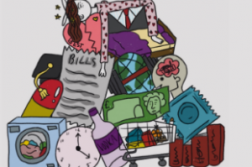Trigger warning: eating disorders; mental health; self-harm.
For as long as I can remember – and even possibly before – I have been battling with an eating disorder called ARFID – Avoidant Restrictive Food Intake Disorder. In short, the disorder reinforces the idea that the majority of foods are ‘unsafe’, which distorts my relationship with food, and makes the process of eating extremely difficult. ARFID itself is a relatively new disorder, leaving even the therapist I visited almost a decade ago clueless as to what he could do to help.
My disorder most likely stems from the deep-rooted trauma I have from choking as a baby, which is not even in my direct consciousness. However, it is important to remember that the origins of eating disorders are, of course, personal. With food being one of the very few things in life that all people have in common, and quite often enjoy, you can imagine that my eating disorder can make things somewhat difficult. This impact only deepens with a lack of personal interest in alcohol, but that’s a topic for another day.
So, how does this interact with my life at university? Metaphorically, my thoughts have manifested themselves into a mental Venn Diagram – with items separated by what I would like to be able to do, and what I can actually do. There is very little in the middle, with the majority stuck firmly in one of the two categories. This makes things difficult socially – not that this aspect of university life wasn’t already hindered by the Covid-19 pandemic – and also in terms of scheduling how to get to appropriate places to eat, around my full-on timetable.
For me, having an eating disorder brings an intense amount of shame, which makes it incredibly hard to discuss this with other people – in fact, this article will be the first time that the majority of my friends have ever heard of it! Thus far, I have not gone into immense detail with anyone, other than two family members who needed to know, which can be quite isolating.
With these feelings of isolation, knock-on effects follow; low confidence and mental health issues to name but a few. For some, having an eating disorder can lead to body dysmorphia, which is most commonly linked to anorexia. Personally, I become nauseous when in the same room as other people eating, which can trigger my anxiety extremely.
Food is a simple part of daily life for most, but for me, it is a weighty inconvenience that I have to deal with every single day. The psychological effects are just as impactful as the physical. To look at me, you wouldn’t be able to tell I had any problem with eating, but the nervousness overtly expressed, in fear of the topic switching to food – or something similar – in social situations, speaks volumes.
Recently, I joined a Facebook group to gain support amongst peers for this eating disorder. I was quite surprised to find that my experience was not actually as bad as others’ experiences, despite it being one of the most difficult things which I have to continually face. It wasn’t until joining this group made me see the more frightening side effects of the disorder – consistent hospitalisation; feeding tubes, and self-harm to name just a few elements – that I realised how different experiences of eating disorders could be.
Thousands of people quietly struggle with these disorders each and every day. As hard as it is to overtly express, please keep a quiet eye on your friends and loved ones – ask them if they have been eating well; looking after themselves, etc. They may not feel ready to reach out, but they will at the very least be touched by your concerned sentiments.



